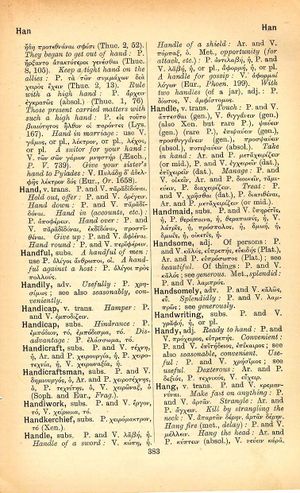hang
ψυχῆς πείρατα ἰὼν οὐκ ἂν ἐξεύροιο πᾶσαν ἐπιπορευόμενος ὁδόν· οὕτω βαθὺν λόγον ἔχει → one would never discover the limits of soul, should one traverse every road—so deep a measure does it possess
English > Greek (Woodhouse)
verb transitive
P. and V. κρεμαννύναι.
make fast on anything: P. and V. ἀρτᾶν.
kill by strangling the neck: V. ἀπαρτᾶν δέρην, ἀρτᾶν δέρην.
hang fire (met., delay): P. and V. μέλλειν.
hang the head: Ar. and P. κύπτειν (absol.), V. νεύειν κάρα.
be hanged: V. κρεμασθῆναι (1st aor. pass. of κρεμαννύναι.
go and hang yourself, interjection: Ar. φθείρου ἐς κόρακας.
those who made laws I would have go and hang themselves: V. οἳ δὲ τοὺς νόμους ἔθεντο… κλάειν ἄνωγα (Eur., Cyclops 338).
hang up, let alone, verb transitive: P. and V. ἐᾶν.
defer: P. and V. ἀναβάλλεσθαι.
verb intransitive
P. and V. κρέμασθαι, αἰωρεῖσθαι, ἀρτᾶσθαι.
be fastened: P. and V. ἀρτᾶσθαι, ἐξαρτᾶσθαι.
my weapons hanging to my side will speak thus: V. (ὅπλα) πλευρὰ τἀμὰ προσπίτνοντ' ἐρεῖ τάδε (Eur., Hercules Furens 1379).
hang over, threaten: P. and V. ἐφίστασθαι (dat.); see overhang.
hang upon, cling to: P. and V. ἐκκρεμάννυσθαι (gen.), V. ἐκκρήμνασθαι (gen.), ἐξηρτῆσθαι (perf. pass. ἐξαρτᾶν) (gen.); see cling; met., depend on: P. and V. ἐξαρτᾶσθαι (gen., or ἐκ, gen.), P. ἀναρτᾶσθαι (ἐκ, gen.), ἀρτᾶσθαι (ἐκ, gen.).

